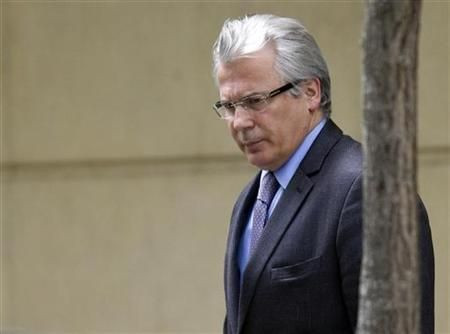Baltasar Garzon: Supreme Court Clears Spanish Judge of Overstepping Amnesty Law

The Supreme Court of Spain has acquitted the prominent human rights activist and investigator Baltasar Garzon on charges that he abused his authority when he sought to probe the murders of more than 100,000 people by security forces and soldiers loyal to Spain’s former dictator Francisco Franco.
Garzon, who is also a High Court judge, was specifically charged with violating an amnesty program for political crimes that was established in 1977, two years after Franco’s death, as Spain made the difficult move to democracy after almost forty years of repressive rule.
The seven-judge panel decided that Garzon -- who become internationally famous for ordering the arrest of former Chilean dictator Augusto Pinochet inn 1998 -- did not do anything that compromised the amnesty rule.
This erroneous application of law does not constitute the offense of exceeding authority, the judges said in its ruling.
Many unanswered questions remain about the abuses perpetrated by the Franco regime.
Garzon said he wanted to investigate unsolved murders and disappearances following requests by the surviving relatives of victims.
Two right wing groups -- Clean Hands and Liberty and Identity – had brought charges against Garzon claiming he exceeded his legal bounds in ordering the probes.
Human Rights Watch (HRW), which supported Garzon’s inquiries into Franco-era crimes, hailed the ruling.
The Supreme Court has spared itself further embarrassment by rejecting these ill-advised charges, said HRW lawyer Reed Brody, according to Reuters.
The campaign to overturn Spain's amnesty law will now begin in earnest.”
However, HRW also lamented a recent move by the courts to disbar Garzon for eleven years as punishment for secretly tape-recording conversations between defense attorneys and their clients.
Meanwhile, it is uncertain which courts in Spain, if any, have the jurisdiction to investigate crimes – including the existence of mass graves -- from decades ago which may be covered by the amnesty.
Emilio Silva, who represents a group of people seeking answers and redress to crimes committed by Franco’s fascists, said: Dozens of courts in Spain received cases, some have initiated proceedings, others have done nothing and some have returned them to the High Court considering it to have jurisdiction. The Supreme Court should with the greatest urgency ... state which court is competent so that the mass graves can be investigated.
Moreover, Garzon remains a highly controversial figure in Spain.
Tom Burridge, a BBC correspondent in Madrid, commented on the ongoing legal drama: “This is not the case against Baltasar Garzon which has attracted most of the publicity in Spain. The verdict in his second trial, which looked at his attempts to investigate alleged crimes carried out under the former dictatorship of Francisco Franco will be more controversial and will have wider implications for the country, whatever the result. However many people, especially Judge Garzon's supporters, see the two trials as one. They perceive these two trials, and a third which is still pending, to be a ‘vendetta’ by the political right, against a judge who is regarded as a champion of human rights and justice by the Spanish left.”
Burridge added: “As much as [Garzon] is loved by some, in particular the relatives of people who went missing under Franco's regime, Judge Garzon is hated by others who feel he is a politically motivated judge who seeks controversy and the media limelight. Whereas most international commentators are dismayed that the man who attempted to put the former Chilean dictator, Augusto Pinochet, on trial has now been tried himself, in Spain the issue divides opinion and evokes strong feelings on both the right and left of Spanish society.
© Copyright IBTimes 2024. All rights reserved.





















